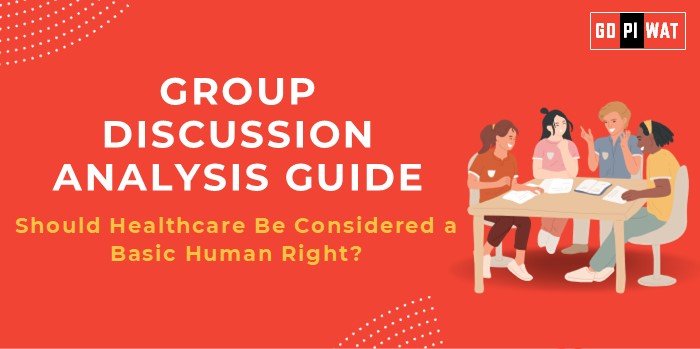📋 Group Discussion Analysis Guide: Should Healthcare Be Considered a Basic Human Right?
🌟 Introduction to the Topic
“Access to healthcare is a defining feature of social justice, often regarded as a cornerstone for a prosperous and equitable society. This topic sparks debates on moral obligations, economic feasibility, and governmental responsibility.”
The Universal Declaration of Human Rights (1948) by the United Nations declares healthcare a fundamental right. However, its application varies globally, creating disparities influenced by economic, political, and social systems.
📊 Quick Facts and Key Statistics
- 🌍 Global Healthcare Spending: $8.5 trillion annually (WHO, 2023).
- 📉 Access Inequality: Over 400 million people lack access to essential healthcare services (World Bank, 2023).
- ⏳ Life Expectancy Gap: Up to 30 years’ difference between high- and low-income nations (WHO, 2023).
- 💰 Public Health Budget: India spends 2.1% of its GDP on healthcare, below the global average of 5% (2023).
👥 Stakeholders and Their Roles
- 🛡️ Governments: Frame policies, fund public health initiatives, and regulate private healthcare.
- 🌐 International Organizations (WHO, UN): Advocate universal healthcare frameworks and provide technical assistance.
- 🏥 Private Sector: Innovate medical technologies and bridge gaps in healthcare delivery.
- 📢 Civil Society: Drive awareness and hold stakeholders accountable.
🏆 Achievements and Challenges
🎯 Achievements:
- Global Progress: Countries like Norway and the UK demonstrate successful universal healthcare systems.
- Health Metrics Improvement: Vaccination programs have drastically reduced diseases like polio and smallpox.
- Technology Integration: Telemedicine expanded during the COVID-19 pandemic, improving rural access.
⚠️ Challenges:
- Affordability: Out-of-pocket expenses push 100 million people into extreme poverty annually.
- Infrastructure Deficiency: Low doctor-to-patient ratios in developing nations.
- Global Comparisons: The U.S. system exemplifies high-cost healthcare despite advanced facilities, while Cuba achieves remarkable outcomes at lower costs.
🗂️ Structured Arguments for Discussion
- ✅ Supporting Stance: “Healthcare as a human right is foundational to social equity and economic productivity.”
- ❌ Opposing Stance: “Resource constraints make universal healthcare unattainable for many governments.”
- ⚖️ Balanced Perspective: “While healthcare as a right is ideal, practical challenges like funding and infrastructure must be addressed first.”
🎙️ Effective Discussion Approaches
- 📈 Opening Approaches:
- Cite the WHO statistic on access inequality.
- Use a compelling ethical argument: “Denying healthcare equates to neglecting humanity’s basic needs.”
- 🛠️ Counter-Argument Handling:
- Highlight success stories like Norway.
- Present scalable solutions like telemedicine in developing countries.
📌 Strategic Analysis of Strengths and Weaknesses
- 🌟 Strengths: Ethical imperative, proven models in developed nations, increased productivity.
- ❗ Weaknesses: High costs, dependency on taxation, implementation challenges in rural areas.
- 📈 Opportunities: Global partnerships, public-private collaborations, innovation in delivery models.
- ⚠️ Threats: Rising healthcare costs, geopolitical instability, and climate-related health challenges.
💡 Connecting with B-School Applications
- 🌍 Real-World Applications: “Analyze healthcare challenges for operations management or sustainable policy models.”
- 🎓 Sample Questions:
- “What is the role of public-private partnerships in achieving healthcare for all?”
- “Compare the healthcare systems of developed and developing nations.”
- 📘 Insights for Students: Highlight the interdisciplinary approach to solving healthcare challenges involving policy, technology, and operations.


